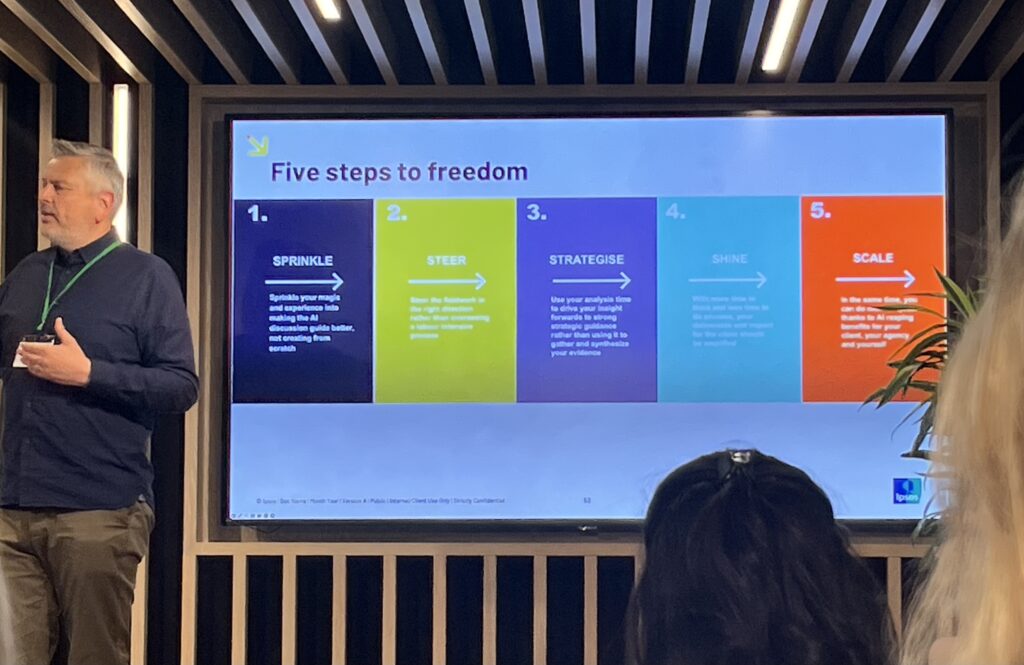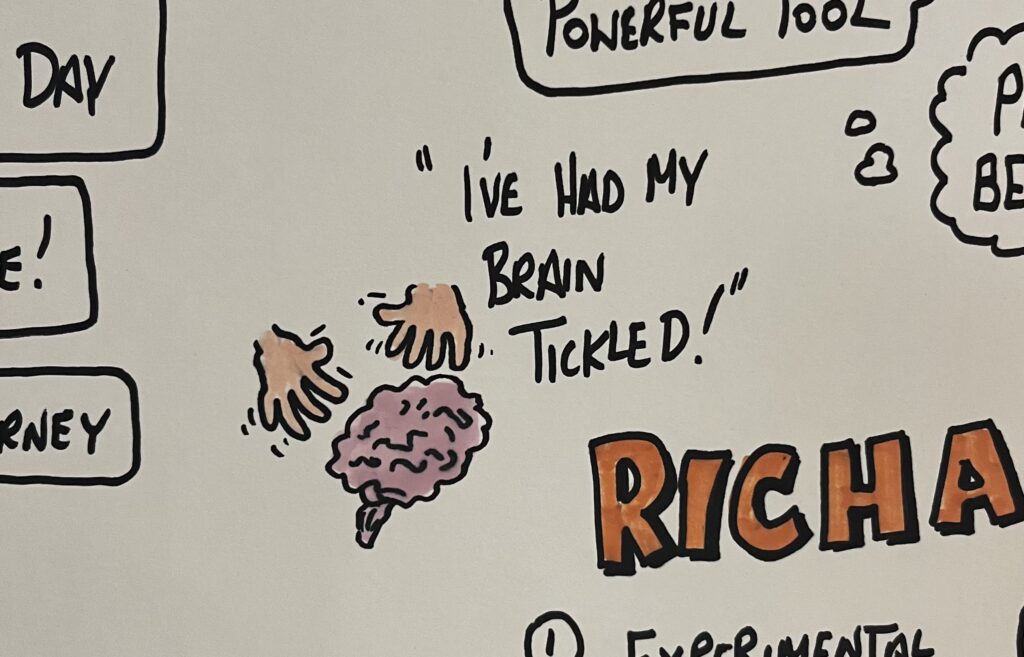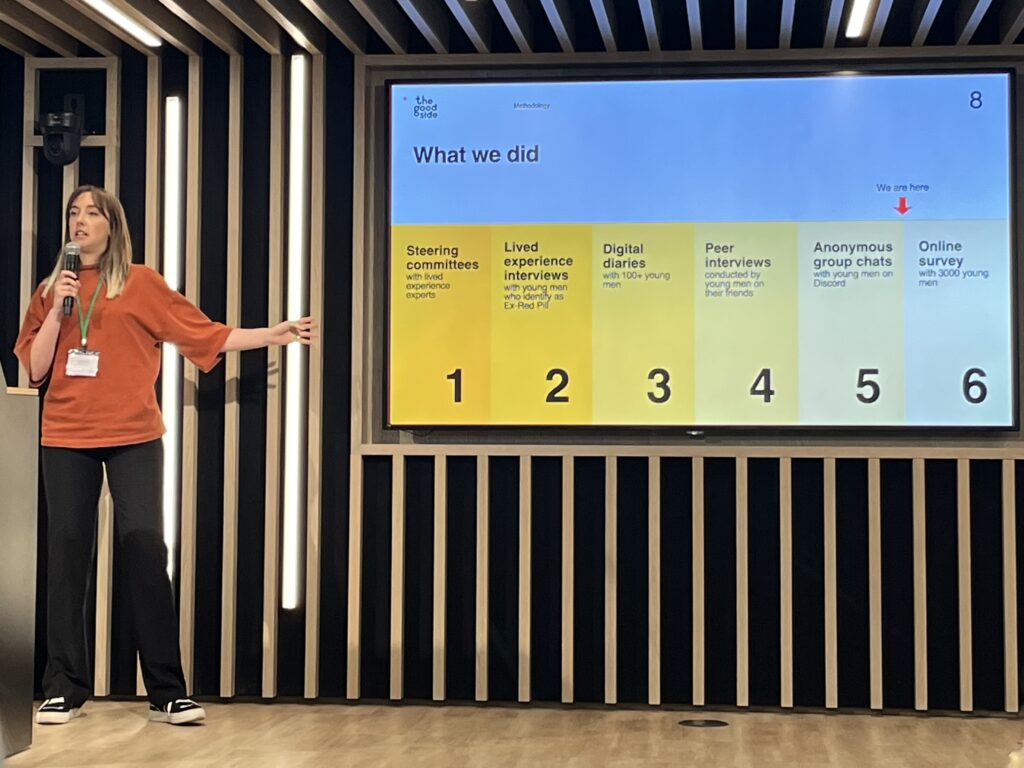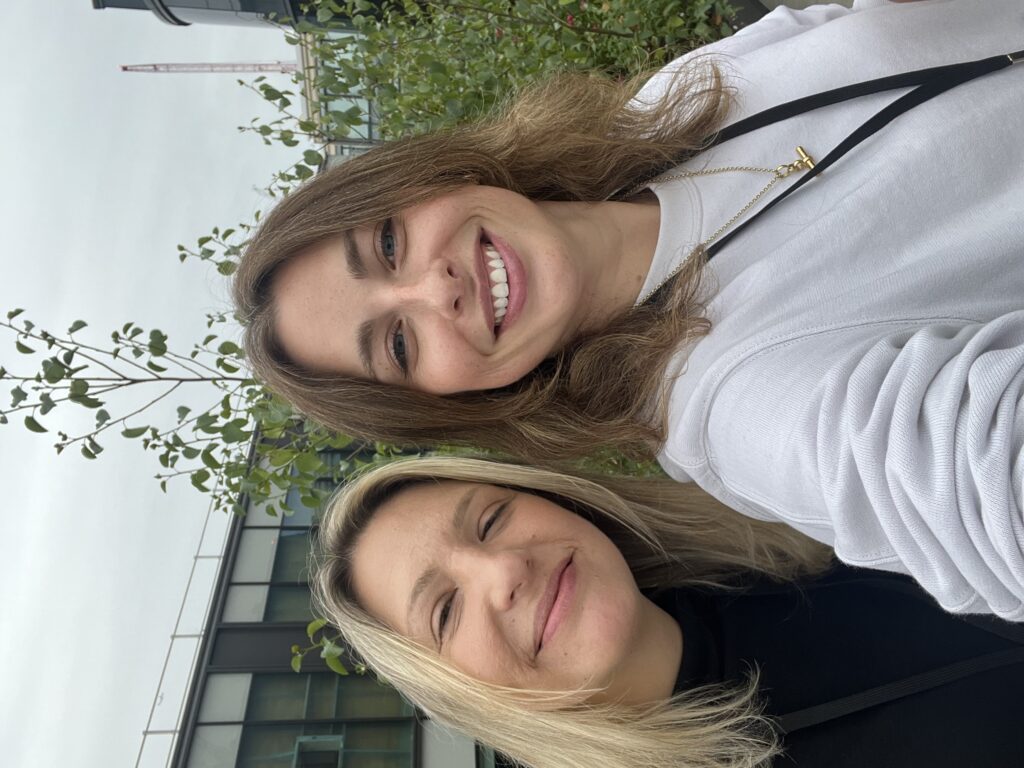Humanity Fights Back!
A pretty solid title to live up to – so it was with much excitement that we (Genevieve and Susy) headed off to London to take a deep dive into the world of qualitative research. There were many fascinating and insightful presentations divided into three sessions – the following is a summary of what was shared.
Is Qual learning to live with, even love, AI?
AI continues to be a controversial subject in a qual world that concerns itself with understanding human insights from a place of empathy, but there was a general grudging acceptance that the rise of AI is a tide that can’t be turned. If implemented in the right way, which honours the areas that generative AI is fundamentally good at, AI can be a friend rather than a foe in the research world. From doing the initial heavy lifting of summarising findings to creating images that were previously inaccessible to support guided visualisation in research, there are plenty of capacities where AI can make life easier in the world of qual. But the true power of AI can only really be unleashed when it is combined with human skill, experience and nuance. AI cannot replicate the very human ability to adapt, interpret, read the room, understand the unsaid, strategise, empathise and handle the unexpected, which is ultimately where the true value lies in delivery of high-quality research.
What AI may do in the future is to change the structure of research agencies, amongst many other industries. AI will likely be deployed to instantly filter through raw data, summarise, providing swift structure and process, the jobs traditionally done in more junior roles. What will be needed as a result is an increase in the number of senior roles providing experience-based understanding and delivering insights, to tailor and adapt the output from AI sources. But how do you get to be experienced enough for the senior roles if you haven’t done the learning that comes with the heavy lifting junior roles?
In conclusion, the brave new world of AI is coming and it’s pretty unlikely that AI will steal your job if you work in qualitative research! With transparency, adaptability and a positive mindset when it comes to innovation, there is nothing to worry about, and potentially even a lot to look forward to.

Best in show – Richard Owen from Firefish talking about finding harmony between humans and robots in the qualitative world.
Breaking out of the echo chamber
There probably aren’t many other sectors where the need for true diversity, equality and inclusion are more paramount than the field of research. Box ticking exercises have never been obvious, so how do you make sure that you are not only getting the right people in the room, but ensuring that their views and opinions are respected and valued? First and foremost, and at the core of all qual research, is to start from a place of empathy. Underrepresented and traditionally unseen groups must be treated with respect, transparency and authenticity in a meaningful way that earns trust and allows for true representation. Quality research will require being metaphorically and literally in the room, not just looking in through the window – whether that means engaging with peer research, providing an expert in the field to lead the research, or meeting the demographic in their own space. One size does not fit all and there is no such thing as a monoculture.
In simple terms, if you want to speak with someone, make sure they can speak to someone in their own language. If you want authentic opinions, make sure that the person asking the questions has reference points to understand the answers. If you want to talk with a community, go to where they are most comfortable, with or without tech as appropriate, don’t expect them to come to you.
Trust is fundamental. Why would groups that have traditionally been underrepresented want to share their opinions and views when they have historically been discounted, plundered or used against them? Trust takes time – this is the opposite of agile research; short time frames may be impossible.
In conclusion, effective representative research requires authentic and transparent approaches that acknowledge diverse needs to match diverse populations. But if you can get it right and make the participants your priority, these are the spaces where genuinely magical and important work can be done.

Best in show – Geroge Oyebade and Iona Scott-Mathieson from On Road sharing how they have engaged in a reciprocal and authentic way with Gen Z
Authenticity in an age of self-censorship
How do you extract authentic opinions in a research setting when participants are increasingly uncomfortable in sharing honest takes? With cancel culture, the belief that ‘you can’t say anything anymore’, and culture wars, having opinions and expressing them has become a risky business, which can be prohibitive to say the least within the research space. While self-censorship is nothing new, it is trending upwards, and has been since the 1950s. With this being further heightened by the permanence of sharing views in a digital space, there has been a lack of debate and nuance, that in combination with polarisation and diminishing empathy has resulted in digital amplification, volatile outcomes, toxic debates and unsurprisingly, timidity and a suppression of open views.
The research world, especially within qual, must respond accordingly to ensure that respondents feel comfortable enough to break this cycle and share their thoughts openly. Easier said than done! The secret is to ensure that research space feels safe. Without a feeling of security, privacy or anonymity, and the understanding that they come to a place without judgement, respondents are unlikely to feel secure enough to divulge the opinions that they have ultimately been brought there to share. The challenge is to create this feeling in any given project, sometimes in incredibly short time frames, sometimes sustained over weeks and even months.
In conclusion, truly successful qualitative research, particularly that conducted on contentious or charged topics, must be objective and impartial, and come from a place of fairness with a willingness to hear from the ‘other side’. Without hearing the opinions that may be most controversial or challenging, how can we really know the world around us?

Best in show – Kym Loeb from The Good Side sharing the fascinating and complex research they did with young men in controversial digital spaces with Movember
What a pleasure to have attended such an inspiring, cerebral, at times hilarious and heartbreaking conference, to hear from some of the very best people doing groundbreaking work in such an important industry. All of which was topped off very nicely with a glass of fizz, a good view and chewing the fat with our fellow attendees at post event networking. The only dampener was heading home to Manchester in the rain! We are very much looking forward to next year already.
Thanks for reading,


